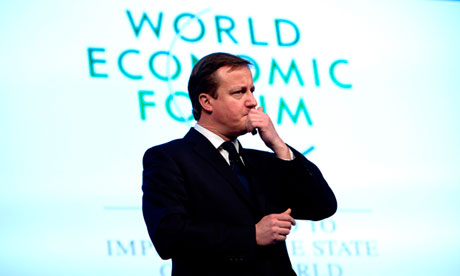David Cameron has taken a sideswipe at Starbucks as he promised that making business pay its fair share would be one of the three key aims of Britain's G8 presidency.
"Companies need to wake up and smell the coffee, because the customers who buy from them have had enough," the prime minister told business leaders at the World Economic Forum in Davos.
Protesters targeted Starbucks branches late last year after the multinational coffee chain admitted it had paid just £8.6m in corporation tax in the UK over the past 14 years. The firm subsequently promised to pay £20m over two years, amid fears of a consumer boycott.
Cameron's speech attracted strong criticism from the body that represents Britain's accountants, but the prime minister insisted he was the most "pro-business leader" you could find. He said it was not just NGOs that had been lobbying him to crack down on tax-dodging corporations, but the upper echelons of the City as well. "It's a world where some companies navigate their way around legitimate tax systems – and even low tax rates – with an army of clever accountants."
The prime minister said there was nothing wrong with sensible tax planning, but "some forms of avoidance have become so aggressive that I think it's time to call for more responsibility and for governments to act accordingly".
He said: "In the UK we've already committed hundreds of millions into this effort – but acting alone has its limits. Clamp down in one country and the travelling caravan of lawyers, accountants and financial gurus just moves on elsewhere. So we need to act together at the G8."
John Christensen, director of the Tax Justice Network, welcomed Cameron's stress on beating tax avoidance, but said: "It depends on the details: we need a complete, root and branch reform of how companies are taxed. How do you tax companies when they live outside the nation state, in the ether, and can move their profits to where they pay the least tax?"
Michael Izza, chief executive of the ICAEW, which represents accountants, and was in the audience at Davos, said he was disappointed to hear the prime minister "again dismiss accountants, this time as an 'army' of avoiders.
"We don't recognise that description. Our members do not support illegal tax evasion or the kind of aggressive tax avoidance that we believe to be unethical. In fact, an effective accountancy and finance profession can and does help solve many of the problems the prime minister wants to address."
Cameron used his speech to lay out his agenda for the G8 summit, which will be held in Northern Ireland in June. As well as tightening up the international tax system, the prime minister said trade and transparency would be key priorities for Britain's G8 chairmanship. He strongly attacked companies which indulge in corrupt business practices in poor countries. Britain last held the G8 in 2005, when Tony Blair put aid, trade and debt relief high on the agenda at the Gleneagles summit.
Cameron said there was still unfinished business on trade and called for the completion of a free trade deal between the European Union and the US which he said could add £50bn to Europe's economy. Seeking to reassure the business leaders gathered in Davos that his focus on tax did not mean he was anti-capitalist, he said: "I'm as pro-business a leader as you can find." But he added: "I'm a low-tax Conservative, not a 'businesses should pay no tax' Conservative."
"We need to lay down the rules of the game, and we need to be prepared to enforce them," he added. "Proper companies, proper taxes, proper rules."
Cameron said he was proud that Britain was living up to its pledge to spend 0.7% of national income on development assistance, but that greater transparency was needed to make sure the aid was well spent. The prime minister said: "Corrupt government officials in some countries and some corporations run rings around the letter and spirit of the law to rip off hard-working people and plunder their natural resources.
"There's a long and tragic history of some African countries being stripped of their minerals behind a veil of secrecy. We can see the results: the government cronies get rich – some beyond their wildest dreams of avarice – while the people stay poor."
Cameron said that unleashing the natural resources from developing countries for the benefit of local people would dwarf anything aid could do – and transparency was vital to that. Pledging to shine a light on the issue, the prime minister added: "So we're going to push for more transparency on who owns companies, on who's buying up land and for what purpose, on how governments spend their money, on how gas, oil and mining companies operate, on who is hiding stolen assets and how we recover and return them."
Charities welcomed the prime minister's promise to crack down on companies that are exploiting poor countries. Jasmine Whitbread, chief executive of Save the Children International, said: "I would like people going away from Davos to remember as much about this Cameron speech as his speech [on Europe] yesterday."
John Cridland, director-general of the CBI, said: "The majority of businesses pay the right amount of tax, and for the small minority which do not, times are getting tougher, and rightly so."

No comments:
Post a Comment